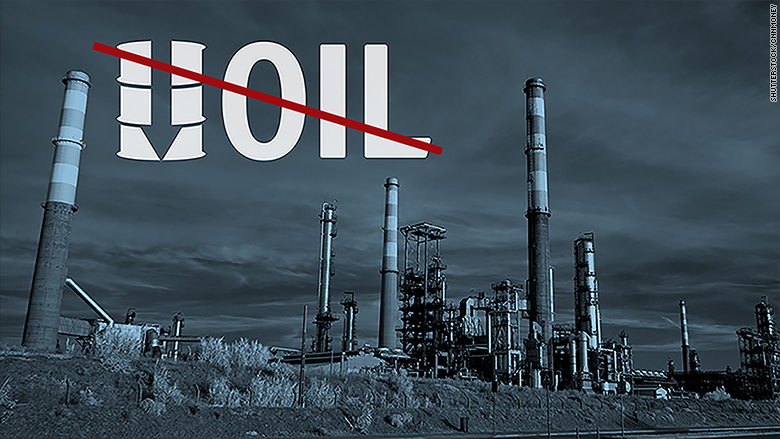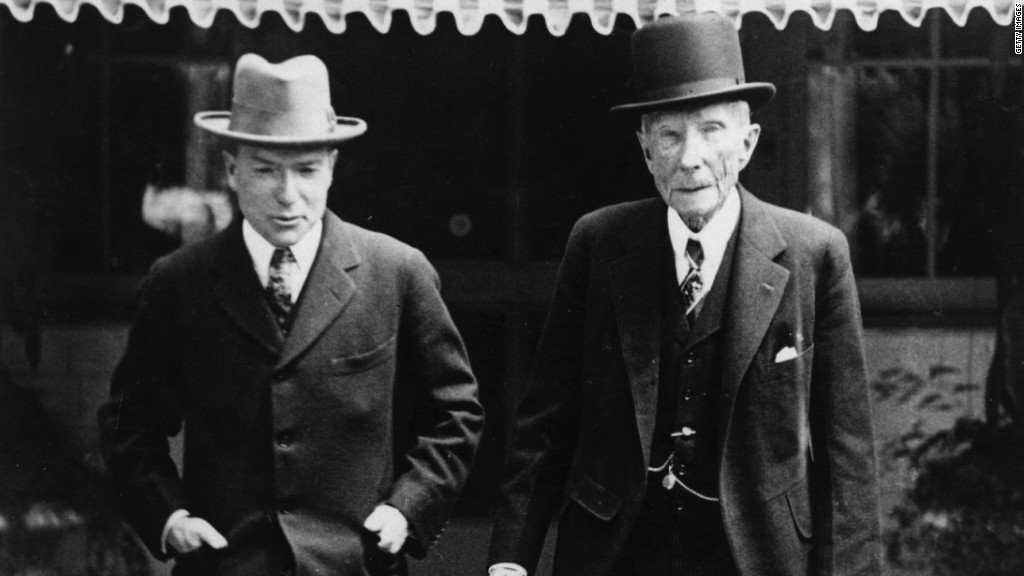
The Rockefeller Brothers Fund stunned the world just over a year ago. The foundation that was built on a Big Oil fortune announced that it would no longer invest in fossil fuels.
No more oil, gas, coal or tar sands assets in its $850 million portfolio.
A year later, the move looks especially wise.
Oil prices have plunged from over $90 when the fund made its announcement in September 2014 to $45 now -- the lowest level since the recession.
Big energy stocks have been clobbered. Energy is by far the worst performing sector in the stock market in 2015. Meanwhile, the climate change divestment movement continues to gain momentum. Rockefeller is no longer an outlier.
"We are able to show it can be done," says Rockefeller Brothers Fund President Stephen Heintz, "without causing harm to the overall performance of your investment portfolio."
Related: Rockefeller Fund divorces itself from fossil fuels
We're still outperforming our benchmarks
Rockefeller is still doing what every investor wants: beating its benchmarks, although the board acknowledges it's still early days.
The divestment decision was primarily a moral one.
"It became increasingly uncomfortable to be fighting global warming on the one hand [through our charitable grants] and then investing in businesses that cause global warming," says Heintz.
But board members also believe there are legitimate economic reasons to divest.
"People are beginning to see a shorter horizon for the fossil fuel economy," says Heintz. He points to Shell having to abandon drilling in the Arctic after spending a lot of money because it is no longer profitable.
Climate change divestment takes time
Climate change divestment still isn't easy. Heintz gets a lot of calls from other foundations and universities that want to follow Rockefeller's lead. He tells them to prepare for "a journey."
The fund has a large pot of money to invest -- over $800 million. Rockefeller was upfront that it would take three years to fully divest.
In the first year, it was able to get rid of most of its stocks and bonds that had exposure to fossil fuel companies such as Exxon Mobil (XOM) and Chevron (CVX).
"Our goal is [eliminating] all fossil fuels, including gas, by the end of 2017," Heintz said. "But we have been clear that we will be closely monitoring performance and will adjust the schedule if necessary and prudent."
He notes the fund had about a 7% exposure to fossil fuels in its portfolio at the start of 2014. Today it has a tad over 4%.
Rockefeller has taken much of that money that was invested in "old energy" and put it to work in "new energy" investments with the help of advisor Perella Weinberg. Call it the "divest-invest" approach to combating climate change.

The hardest part is hedge funds and private equity
The hardest part has been finding hedge fund and private equity managers who can comply with the divestment requirements. They aren't accustomed to special requests.
For example, if Rockefeller pulled its funds from a private equity investment before the lockup period ends, it would lose a lot of money.
But Heintz has been happily surprised at how many managers have been willing to work with the foundation to figure it out. He even got a call from an infrastructure fund in Brazil that saw the 2014 divestment announcement on the front page of a Brazilian newspaper and said they were developing a fossil fuel free fund.
"The decision to divest does send market signals," says Heintz.
Related: Exxon and Chevron profits are down over 50%
Even Wall Street is taking note
Other big investors confirm the trend is catching on, even on Wall Street.
"I just got another email from a hedge fund manager this morning who's trying to assess what the demand is" for fossil fuel divestment, says Jessica Matthews, a managing director at Cambridge Associates, a firm that advises many universities and foundations on their investments.
Matthews works with many clients who want to divest because of environmental, social or governance concerns. She advises clients it could take up to five years to divest fully.
"It's not like flipping a switch," says Matthews.


